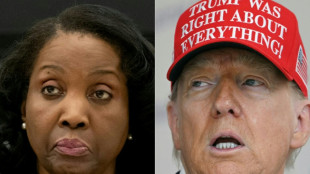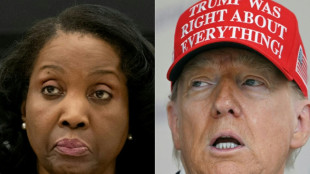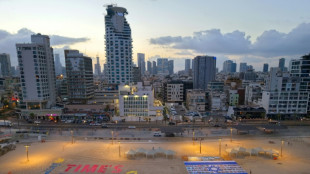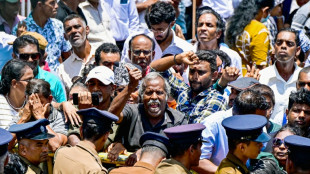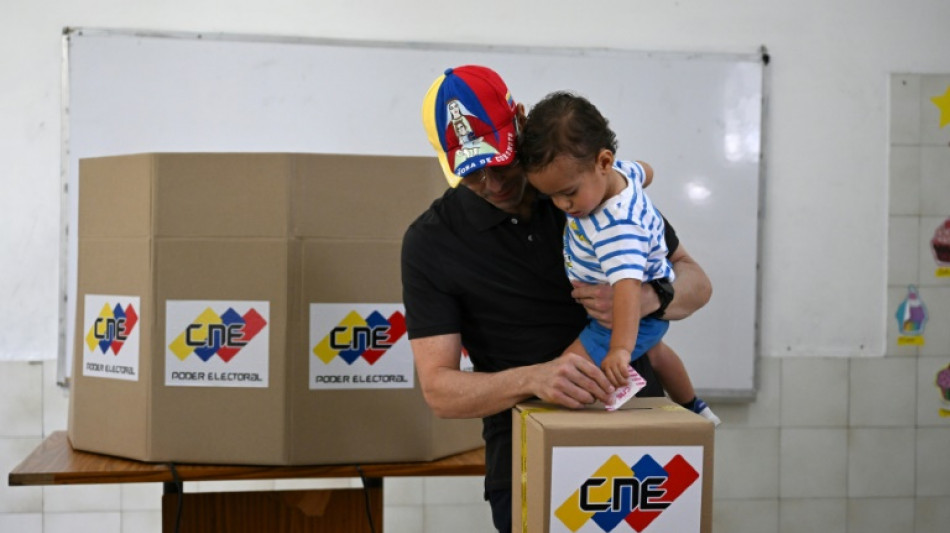
Low turnout as opposition boycotts divisive Venezuela vote

A trickle of Venezuelans lined up at the polls Sunday to choose a new legislature and state governors in a vote that the main opposition party was boycotting in protest at last summer's disputed reelection of President Nicolas Maduro.
Some 21 million voters are eligible to cast ballots for 285 members of the National Assembly and 24 governors, including for the first time in the disputed oil-rich region of Essequibo, on the border with Guyana.
But pollster Delphos projected a turnout of just 16 percent, mostly Maduro supporters, after the main opposition -- led by Maria Corina Machado, an engineer and former lawmaker -- urged Venezuelans not to legitimize what they see as yet another sham election.
Polls opened at 6:00 am (1000 GMT), but by midday AFP journalists at polling stations in Caracas, San Cristobal and Barinas reported that just a handful of voters had turned out.
It was a far cry from the crowded presidential election of last summer, marred by violence and allegations of fraud as Maduro claimed a third-term victory.
"It's empty also because of the time," Carla Romero, a 52-year-old civil servant, told AFP.
"It's an important process of citizen participation," said Samadi Romero, a 32-year-old university student who voted for Maduro's son for the National Assembly.
"I'm not going to vote because I voted (in the presidential election) and they stole the elections. So it's really a farce," said Candelaria Rojas Sierra, a 78-year-old retired civil servant in San Cristobal, on her way to mass to "pray for Venezuela."
The polls officially close at 6:00 pm, although polling stations must remain open as long as there are voters waiting in line.
A small opposition faction led by two-time former presidential candidate Henrique Capriles had rejected the boycott call, arguing that previous voter stayaways had merely allowed the 62-year-old Maduro to expand his grip on power.
"We must vote as an act of resistance, of struggle," said Capriles, who is running for the National Assembly.
- 'Fight the dictatorship' -
Tensions were high in the run-up to the election.
More than 400,000 security agents were deployed to monitor the vote.
A leading opposition member and close ally of Machado, Juan Pablo Guanipa, was arrested on Friday on charges of heading a "terrorist network" planning to attack Sunday's vote.
Interior Minister Diosdado Cabello linked Guanipa, a former lawmaker, to a group of 50 people arrested earlier in the week on suspicion of being mercenaries in the pay of foreign powers.
Venezuela, which frequently alleges foreign-backed coup plots, said the suspects entered the country from Colombia and closed the busy border with its neighbor until after the election.
Guanipa is just the latest opposition leader to be targeted by the authorities.
Opposition presidential candidate Edmundo Gonzalez Urrutia went into exile in Spain last year after a bounty was put on his head.
A message on Guanipa's X account shortly after his arrest declared he had been "kidnapped by the forces of Nicolas Maduro's regime" but would continue the "long fight against the dictatorship."
- US blow to oil revenues -
Many opposition supporters in Venezuela lost any remaining faith they had in the electoral process after last July's presidential election.
Maduro claimed to have won a third term. The opposition published its own tally from polling stations, which appeared to show a convincing win for Gonzalez Urrutia.
A deadly crackdown on protests that erupted over Maduro's victory claim cemented Venezuela's pariah status on the world stage.
Only a handful of countries, including longtime allies Russia and Cuba, have recognized Maduro as the country's rightful leader.
Sunday's election comes as the country's economy -- once the envy of Latin America, now in tatters after years of mismanagement and sanctions -- faces even further turmoil.
US President Donald Trump has revoked permission for oil giant Chevron to continue pumping Venezuelan crude, potentially depriving Maduro's administration of its last lifeline.
Particularly closely watched will be the elections for the National Assembly and for state governor of Essequibo.
Guyana has administered the region for decades but Caracas has threatened to partially annex it.
A.Jackson--SMC


 London
London

 Manchester
Manchester
 Glasgow
Glasgow
 Dublin
Dublin
 Belfast
Belfast
 Washington
Washington
 Denver
Denver
 Atlanta
Atlanta
 Dallas
Dallas
 Houston Texas
Houston Texas
 New Orleans
New Orleans
 El Paso
El Paso
 Phoenix
Phoenix
 Los Angeles
Los Angeles
